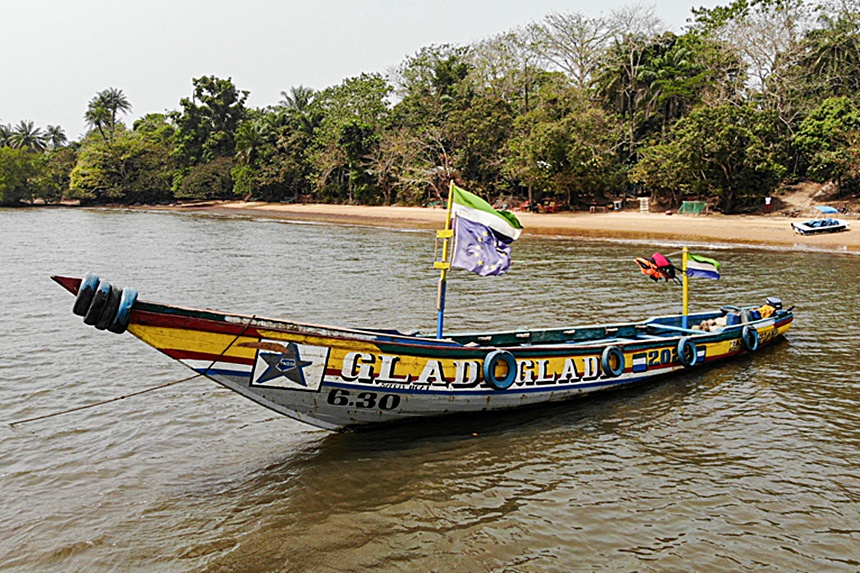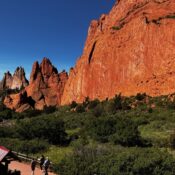The overheated speedboat engine falters, wrestling with the sand it has sucked up through the shallows and — with a final, sputtering cough — dies. Here, in this remote region of southwest Sierra Leone, shifting sandbars dot the jungle-covered coastline, making travel challenging and occasionally hazardous. The Turtle Islands, my final destination, lie five long hours away. With a reputation as West Africa’s tropical Eden, their towering coconut palms, sprawling white beaches, and charming fishing villages would surely be plastered all over Instagram by now if it weren’t for the pesky fact that — as I’m learning first-hand — the archipelago remains largely inaccessible to outsiders.
Stranded in the middle of the ocean with little food, the captain and my tour guide begin to come up with a plan of action, while I helplessly stare out into the horizon. They tell me we should have come on a lighter wooden boat that wouldn’t have become trapped in the sand. I can only think what every type-A, middle-aged woman in therapy inevitably does in a situation like this: What would my mother say?
When I was a kid, we never went on vacations that allowed for any “mistakes” — never mind the kind that leave you adrift at sea. Everywhere we went, whether it was an afternoon at Walt Disney World or a week in Paris, required months of meticulous, obsessive research to ensure we chose the most efficient, most economical, most superlative option. What museum pass would get us into the Uffizi Gallery the fastest? Which bakery in Paris had the best croissant?
These questions each had definitive answers that needed to be riddled out in advance. There was no joy in impromptu discovery. No hedonistic, carb-loaded taste test. And certainly no room for error. To protect against this, my mom used to laminate by-the-hour itineraries for our family outings. (There is no negotiating or adjustment allowed when your day is sealed in plastic.) Missing the changing of the guard due to a leisurely lunch? Not an option.
On the same vacation, I asked if we could stay longer at the Tower of London to gawk at the Crown Jewels and ravens. I was told that would “ruin our plans.” On another night, my jeans prevented us from dining at a ritzy restaurant on our schedule; instead of running back to the room to change or trying one of London’s countless other five-star bistros, sushi bars, or gastropubs, my mom refused to budge. The ensuing (and unsuccessful) standoff with the staff led to a meltdown that left me embarrassed and tense — I never wanted a casual slice of pizza more in my life.
Today, as a professional travel writer, I continue to visit new destinations with a precise agenda. Whether I’m on safari in the Serengeti or rooting out the top art galleries in Mexico City, travel — for me — rarely means escape; it entails responsibility and tight deadlines. Obediently, I march off in search of whatever it is I’m supposed to find — the perfect martini, a rare species of bird, an award-worthy bowl of pasta — my mother’s voice narrating along the way. Don’t forget to triple check your reservations. Are you absolutely sure that’s the best field guide? Maybe do a few more hours of research just in case. Oh, and remember to book a backup hotel. What if the first one decides to renovate at the last minute?
I’m good at my job, but much of this over-the-top planning is rooted in deep-seated anxiety — a gnawing ache in my stomach telling me I must get every itinerary absolutely right, or I will somehow fail. At what, I’m not exactly sure. Maybe it’s not being good enough, or perhaps I fear becoming my mom, chastising a concierge to the point of tears for mixing up a dinner reservation.
Yet over the years, a surprising truth has crept up on me: The trips where everything goes wrong are often the most extraordinary; each misstep leading to the next adventure. In Western Australia, when relentless wind scrubbed my scuba diving charters, I swam with my first humpback whale and explored yawning canyons that many people skip. In France, a national train strike didn’t cause my friends and I to cancel our vacation to Barcelona, but to travel more slowly by bus. We still laugh about the sleepless, delirious journey that ultimately proved to be more memorable than bar hopping in the Gothic Quarter.
During my one-week stay in Sierra Leone, an emerging destination where a lack of tourism infrastructure calls for by-the-minute planning and an intrepid spirit, I learned to fully embrace spontaneous travel — full of impromptu jazz concerts, market visits, and dress fittings — something I never was allowed to experience in childhood. When I wanted to immerse myself more fully in the local art scene, Mary-Ann Kaikai, the fashion designer behind Madam Wokie, and her creative circle of friends invited me into their homes like they’ve known me their whole lives.
My boat breaking down on the way to the Turtle Islands didn’t mean disaster or an emotional blow-up, but a chance to drink fresh coconuts and chat with friendly fishermen. As I waited for our new boat, I slipped into the ocean, letting the waves rock me above a sandbar I doubt any tourist has ever visited before. Later, after a relaxing night on Sherbro Island, I continued to Bureh Beach, Sierra Leone’s surf capital, where the likes of Kadiatu Kamara, the country’s only professional female surfer, practice their skills among a golden coastline strewn with ancient boulders.
I never did reach the Turtle Islands. But don’t tell my mom.
Become a Saturday Evening Post member and enjoy unlimited access. Subscribe now




Comments
Life has become too much of a time regimented drag Ms. Owens, for almost any spontaneity at all. Isn’t it ironic that things have to go “wrong” unintentionally, to be RIGHT after all? I love how well it worked out for you when your boat broke down on the way to Turtle Islands as you described. As far as mom goes, you can honestly say “I wouldn’t have changed a thing.”